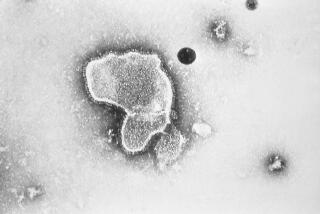Smallpox Vaccine to Be Tested on Children
- Share via
Doctors are planning an unprecedented clinical trial in which the smallpox vaccine will be tested in a small number of children in two states, federal health officials confirmed last week.
The idea is to establish vaccine dosages suitable for children in the event that mass vaccination is needed because of a bioterrorist attack.
Tests, which will be conducted at Harbor-UCLA Medical Center and Cincinnati Children’s Hospital Medical Center, will mark the first time the vaccine has ever been tested in children, using the rigors of modern science.
Though doctors administered the vaccine successfully in children for two centuries before the disease’s eradication, a formal controlled clinical trial had not been performed even in the 1960s, a period well within the era of evidence-based medicine.
Doctors involved in the design of the trial hope testing will begin before the end of the year. Fewer than 50 children are expected to be entered into the trial in both states.
“We’re just waiting for the final word, to hear that it’s a go. All of the pieces seem to be in place,” said Dr. David Bernstein, director of the division of infectious diseases at the Cincinnati hospital. Bernstein will be the chief investigator of the study’s Ohio arm.
He does not foresee trouble enrolling children into the trial and is discussing the test with Cincinnati pediatricians. Because test subjects must be closely monitored and wear special bandages after the inoculation, neither site will accept enrollees from out of state.
“This is a good vaccine, and millions of children have been safely immunized with it,” said Dr. Michael Lane, a smallpox expert now retired from the federal Centers for Disease Control and Prevention.
Medical researchers plan to test the Dryvax vaccine, Bernstein said, which was the same one used to eradicate smallpox in an aggressive global campaign in the 1960s and ‘70s. It is also the same vaccine administered in a nationwide adult clinical trial that began late last year. Findings announced in March showed that Dryvax could be diluted and still be effective.
But Dryvax is not problem-free. Although doctors believe current medical knowledge may make the vaccine safer, it is a live-virus vaccine that has caused encephalitis and potential brain damage in some recipients. It also carries a 1-in-1-million chance of death, a ratio worked out by Lane and colleagues in a series of groundbreaking studies on the vaccine conducted at the CDC in the 1960s.
Vaccine doses to be used in the pediatric trial are more than 40 years old and are based on viral stocks that first were prepared by the New York City Health Department at the turn of the 20th century. Dryvax, public health officials say, is a mainstay in the National Pharmaceutical Stockpile. The stockpile is the government’s cache of medications, vaccines and other supplies that are deployed in the event of an attack. The stockpile is kept in several secret locations.
Dr. Carol Heilman of the National Institute of Allergy and Infectious Diseases, and one of the pediatric trial’s designers, said researchers will be seeking some of the same answers that were sought in the adult study.
In the adult trial, lower strengths than would have been administered in the 1950s or ‘60s proved powerful enough to generate a “take,” evidence of an immune response.
Heilman said there are still technical matters that must be resolved before the trial can begin. For that reason, no one can set a starting date, she said.
In addition, the trial’s protocol is still under review by the National Institute of Allergy and Infectious Diseases. A core unresolved matter is the age groups of children that will be sought.
The trial is to be jointly overseen by the National Institute of Allergy and Infectious Diseases and the Food and Drug Administration.
*
Delthia Ricks writes for Newsday, a Tribune company.






